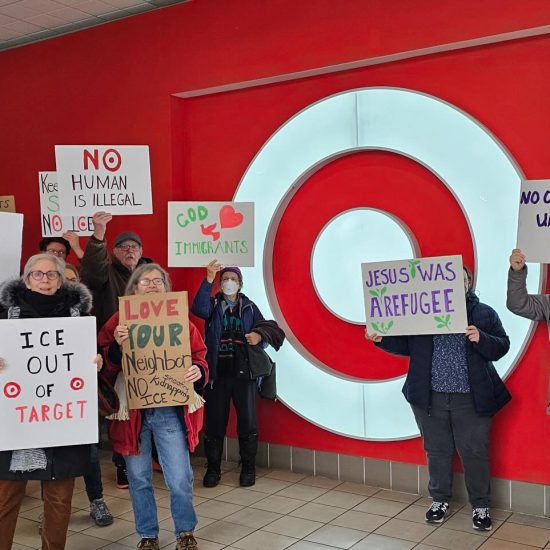
But when the pandemic hit, Moran, now 34, was struck by the government’s inability to provide for her family.

Recent Instagram posts by Taylor Moran. (Screen grabs)
“It was a lot of rules, a lot of hysteria, a lot of things that didn’t make sense,” Moran told RNS.
In early 2021, after what she described as an “overnight spiritual experience,” Moran embraced Christianity and moved her family to rural Arkansas. As her faith grew, so did her skepticism of the pharmaceutical industry, rigid school curriculums and gender as a construct. Today, while her social media content isn’t overtly political or religious, her convictions surface in posts about organic whole foods, her family’s nature school, and how to raise sons.
“I hear it’s hard to be a man right now — but I *know* it’s hard to be a boy,” she wrote in an October Instagram post. The accompanying video features her young sons running barefoot through the woods, whittling, and bounding over hay bales. “There’s this widespread cultural effort to erase boyhood, to pretend there’s nothing different about it, nothing special about it.”
In the wake of the COVID-19 pandemic, many American mothers like Moran began to question the institutions they had once trusted to uphold their lives. Into that vacuum stepped conservative Christian women influencers — like political commentator Allie Beth Stuckey, Make America Healthy Again pioneer Alex Clark, and anti-trans activist Riley Gaines Barker — who blend religion, polished aesthetics, and personal stories to build trust on issues from food dyes and vaccines to transgender athletes and immigration. By appealing to maternal concerns about what kids eat or learn and offering a sense of clarity, community, and stability, they’re creating an on-ramp for conservative political engagement that many of them frame as part of a spiritual war.

Allie Beth Stuckey speaks during the “Share the Arrows” women’s conference, Saturday morning, Oct. 11, 2025, at the Credit Union of Texas Event Center in Allen, Texas. (RNS photo/Kathryn Post)
Stuckey, for one, is clear that she believes demonic forces are at play in battles over abortion and “gender ideology.” Since 2018, Stuckey, 33, has offered Scripture-fused conservative commentary on her enormously popular “Relatable” podcast. Though her political takes are no more subtle than her male counterparts’, her upbeat, measured tone, understated makeup and lifestyle-brand partnerships are designed to appeal to millennial women. And during the pandemic, Stuckey told RNS, she began to notice a deeper need among her audience.
“Post-COVID, a lot of people felt isolated. And post all of the events of 2020, a lot of Christian women felt like, oh my goodness, I’m alone,” Stuckey told RNS during an interview at her Share the Arrows conference in Texas last month. “People really feared saying what they believed to be true, because they didn’t want to be canceled or condemned, or, you know, get their business taken away from them.”
For many women during the COVID-19 pandemic, vaccine mandates were the inflection point. That was the case for Clark, a 32-year-old Scottsdale, Arizona-based wellness influencer.
“I just started slowly questioning more and more about the advice we were being given,” she told RNS. “They’re telling us that we all need to be vaccinated with the COVID vaccine. If we don’t … you may or may not be able to participate in public life, essentially. That was deeply unsettling and disturbing to me.”

Alex Clark. (Courtesy photo)
Suspicion about the COVID vaccine and learning about the U.S. Food and Drug Administration’s role in the Purdue Pharma opioid scandal left Clark distrusting the government and medical establishments. And she wasn’t alone. Sociologist Katie Gaddini, author of the forthcoming book “Esther’s Army: The Christian Women Who Power the American Right,” said that in 2020, pandemic skepticism, pushback to the Black Lives Matter protests and disbelief over Trump’s election loss culminated in widespread conservative disillusionment. “That shift has elevated the trust and the importance that is given to these forms of Christian conservative media figures,” she said.
These days, Clark is one of those figures. In videos with attention-grabbing, all-caps headlines shared with her over half a million Instagram followers, Clark — once a self-proclaimed “ultimate Chicken Nugget princess” — covers everything from regenerative farming, Crumbl Cookie (which she calls “Cancer Cookie”) and skincare products to Godly male headship. In 2024, her Turning Point USA-affiliated podcast rebranded as “Culture Apothecary” to focus on wellness, and she has championed the Make America Healthy Again movement, which lionizes Robert F. Kennedy Jr. and rejects food dyes, seed oils, and ultra-processed foods. “Crunchy moms” and other wellness-oriented women are central to Clark’s Culture Apothecary audience; Clark, who isn’t a mom, is single but eager to marry.
“There are people that are going to discover my show that identify more moderate left, and they’re going to get red pilled, and they’re going to become conservative,” Clark told RNS. “If the government is lying to you about the food pyramid … you think that they don’t lie to you about other things?”
Personal posts and firsthand accounts help these influencers earn trust. Former collegiate swimmer Riley Gaines Barker, 25, who famously tied for fifth with trans athlete Lia Thomas in a 2022 NCAA championship race, links her activism directly to that experience. And Clark has said the health of her father, who died last year at age 57 after battling brain cancer and heart failure, was worsened by his addiction to ultra processed foods.
“If you dive in a little bit deeper, they all have experienced issues that they’re talking about,” said Gwyn Andrews, 22, who is chapter president of Students for Life and of TPUSA at the University of West Georgia. “I think credibility is a big way that they are able to gain these massive amounts of followers.”
These influencers delicately balance being leaders without being feminists, and embracing traditional gender roles without being “trad wives” (an adjacent movement). They prefer femininity to feminism, which they model by documenting their roles as wives and mothers and by wearing makeup, feminine clothing, and long, barrel-curled hair.
“I think we’re beginning to see a shift away a little bit from the whole girl boss culture,” Gaines Barker told RNS, referencing the movement fueled by female career ambition. Gaines Barker, who hosts the weekly podcast “Gaines for Girls” on Fox Corporation-owned sports website OutKick, added that she’s seeing other conservative influencers increasingly celebrate motherhood and domesticity — though for many, their roles as full-time activists or content creators disqualify them from the trad wife category (“I’m not a trad wife at all. I’m the breadwinner!” Moran told RNS).

Taylor Moran. (Courtesy photo)
Sara Petersen, author of the 2023 book “Momfluenced: Inside the Maddening, Picture-Perfect World of Mommy Influencer Culture,” says external markers of femininity grant influencers a “morality that we sort of assume is sacrosanct.”
Andrews, the West Georgia student, told RNS the influencers represent a clear belief system she contrasted with the values of “the left,” which she sees as blurring the lines “between man and woman” and moving away from reality. This sense of clarity comes in the form of defined gender roles and by way of biblical interpretations understood as objective truth.
Stuckey, for instance, believes Scripture unequivocally condemns abortion as murder and clearly defines marriage, manhood, and womanhood. Her 2024 book “Toxic Empathy: How Progressives Exploit Christian Compassion” argues progressives exploit empathy to compromise biblical truths about gender, sexuality, abortion, and immigration — a framework influencing many young conservatives, including Carolina Graver, a 29-year-old inspired by Stuckey to serve on her local city council in Palmer, Alaska.
“When you get to the issue of, abortion is murder, and the Bible does say that being gay or acting on that impulse is a sin, then … you have to be able to separate that empathy that you’re feeling for that person from the truth,” said Graver. “You can still love that person, but you can love them in a way that’s biblical.”
Despite conservative Christians’ current political power, these influencers and their followers see themselves in a culture war where their values are under attack. They frame those attacks as literal (the assassination of Charlie Kirk), cultural (the normalization of divorce and LGBTQ+ rights), and, above all, spiritual. Clark, who advocates for naturally raised animal products and regenerative farming, told RNS she saw conventional farming and its treatment of animals as “deeply demonic;” Gaines Barker framed her activism around transgender issues as part of a “spiritual awakening.”
“This is a fight to which every single Christian is called, and it’s not fought on a physical battlefield or even only in the public square,” said Stuckey from the stage of her Share the Arrows conference outside Dallas last month, attended by 6,700 conservative Christian women. “This is a spiritual battle that is waged in our homes and in our neighborhoods, at school, at your job.”
In these spiritual battles where Satan is the enemy, there’s real-world impact. This year, both Georgia and West Virginia passed bills named for Gaines Barker, banning trans women from participating in women’s sports and protecting “women’s single-sex spaces,” respectively. At least 27 states have passed laws banning transgender students from competing in sports consistent with their gender identity.
Clark, who this spring spoke in favor of a bill banning certain ultra-processed foods in Arizona public schools, believes Trump’s alignment with Kennedy’s MAHA movement contributed to his victory last fall.
“The MAHA moms are the most powerful political capital, if you will, that the GOP has,” Clark said. “Nothing is politically more powerful than an angry mother.”
Though exit polls did not show a specific uptick in Trump votes among moms from 2020-2024, there was a shift to the right among women aged 18-29 (32% voted for Trump in 2020 and 38% in 2024) and among white evangelical women (71% in 2020 and 80% in 2024).
Fueled by political wins, some influencers are becoming more emboldened in their rhetoric. Gaines Barker frames her decisions to use the deadnames and incorrect pronouns of trans individuals as “telling someone the truth.” Clark, in discussing the risks of hormonal birth control, readily calls it poison — and sees food dyes and processed foods as part of a liberal plot.

Sara Petersen. (Courtesy photo)
“You’re more reliant on the government when you’ve got seven different chronic diseases,” she told RNS.
Stuckey has long associated calls for social justice with “glorifying victimhood,” and in the wake of George Floyd’s death, questioned whether his killing by a police officer was tied to race. Last month, she told RNS that “a lot of Christian women’s conferences will dabble in the social and racial justice, and I have zero tolerance for that, and that will never be at Share the Arrows.”
Petersen, the “Momfluenced” author, worries that when influencers use dehumanizing rhetoric against groups of people, it can justify everything from physical violence to political policies that strip away rights, as with the anti-trans bills and the recent banning of federal DEI policies.
“It’s not that I think these individuals are going to assassinate someone, but I think their rhetoric does help support a lot of legislation and policies that are straightforwardly violent,” Petersen said.
But to the women inside this movement, growing unapologetic is a sign that their efforts are having an impact. Payton McNabb, a 20-year-old conservative activist and former high school volleyball player who says she was severely injured during a match with a transgender player, noted that today, it’s more acceptable for people to say things that would have previously gotten them “cancelled immediately.”
“I definitely do think it’s a culture war, and I think that we’re starting to get the upper hand finally,” McNabb told RNS. “I’m very thankful to be a part of that shift.”






